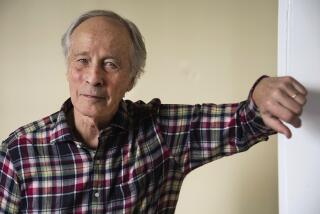‘Whodunit’ Suggests Author’s Fame Is No Mystery
- Share via
MONTREAL — At 48, Yves Beauchemin has nurtured a low-grade anxiety over what he regards as the ongoing pillage of his native province, Quebec. Coupled with a well-honed appreciation for the occasional absurdity of French life in an English-dominated continent, this has helped him become his province’s best-known living novelist.
Beauchemin is a rarity in French Canada: a writer of such distinct narrative power and universal appeal that his books are read around the world. “The Oxford Companion to Canadian Literature” has called him “one of the most gifted storytellers to emerge in recent years in French-language literature.”
In France, where the natives are always finicky about accepting non-native writers, few have taken issue with this characterization. Beauchemin’s second novel, published in 1981 as “Le Matou,” sold more than 750,000 copies as a French book-of-the month-club offering.
“Le Matou” is the Faustian tale of a young man, Florent Boisonneault, who falls prey to a Mephistophelean figure, Egon Ratablavasky. The old man persuades him to buy out a popular Montreal restaurant. Florent soon realizes that he has been duped. Worse, he learns that the entire city, including his Anglo partner, appears to have fallen under the evil Ratablavasky’s influence.
Ranking French critic Bernard Pivot called “Le Matou” “a revelation.” The book later won that country’s prestigious Prix du Roman de L’Ete. “Le Matou” has since sold 1.2 million copies, in various French editions, throughout the French-speaking world. It was adapted in 1985 as a six-part TV miniseries as a joint French and Quebecois production.
In the U.S., which has little or no historical affinity for Quebecois literature, “Le Matou” was published five years later by Henry Holt & Co. in translation as “The Alley Cat.” Warmly received by American critics, it sold a respectable 40,000 copies in hardcover (a quarter of these sales in English Canada), and has since been translated into 15 languages, including Finnish, Romanian and, most recently, Hebrew.
Now that Beauchemin has published a new novel--the nearly 700-page-long and still-to-be-translated “Juliette Pomerleau”--fans in both French and English Canada are betting that he will reach an even wider readership. “Juliette Pomerleau,” published in March by Quebec-Amerique, sold more than 50,000 copies during its first month, and sales have remained steady since.
Critics in Quebec have written that the book, which he defines as “sort of a detective novel without a detective or, for that matter, a crime,” confirms Beauchemin’s position as French Canada’s master storyteller. One of them characterized the book as “another Titanic--only this one floats.”
Like the characters who populate his picaresque novels, Yves Beauchemin has not succumbed passively to the inequities and insularity of life in what some have described as “Fortress Quebec.” There is a sense in his books of the new Quebec: a secular would-be republic eager to embrace the capitalism and materialism rampant on the continent even as it remains wary of the inexorably seductive pull of the English language that dominates it.
Yet in his novels, which have been called Dickensian in their sense of place and Balzacian in their depth of character, people are also always making off with whatever bits and pieces of Quebec that are not bolted to the ground. In “The Alley Cat,” for instance, Beauchemin’s alter ego witnesses the removal of a clock from an historic Gothic church. It is to be installed, he learns, in a Connecticut amusement park.
“Those Americans,” complains a woman onlooker, “they are bloody powerful, eh?”
This perhaps reflects his vision of Americans in Quebec, where Beauchemin has lived his entire life.
As a child growing up in Clova, a northern Quebec lumber town owned by a New York paper company, Beauchemin witnessed the decimation of the province’s once-plush woodlands. In his view, Canada was a colony of the U.S., and Quebec, a colony of Canada. Now, the English in both countries appear intent--or so it seems from where he stands--upon decimating the province’s cultural and linguistic viability as well.
As Beauchemin, an avowed independiste, or separatist, sees it, English Canada has systematically sapped Quebec of its sovereign potential. Even the federal policy of bilingualism, which was adopted during the 1960s to assure the equality of French and English as official languages throughout Canada, remains, for many Quebecois, a no-win proposition.
“I am profoundly convinced,” Beauchemin told the Montreal Gazette, “that Quebec cannot reach its full potential without attaining independence. That doesn’t mean I wish all the Anglophones would go to hell.” Without independence, Beauchemin and others fear Quebec will ultimately disappear linguistically and culturally into English North America. “We are,” he once said of French Quebec, “like a cube of sugar beside a gallon of coffee.”
Beauchemin was born in Noranda, a northern mining town near the Ontario border, where his grandfather published a newspaper, Le Frontiere. When he was 5, he moved with his family to Clova, near Abitibi, 200 miles away, where his father worked as a field inspector for the New York-based International Paper Co.
“For a kid,” he said, “it was a wonderful place, just tremendous. There were no police, no mayor, only the most minimal degree of social organization, and there was a lot of space.”
If one could endure the seclusion--the town was fed by a single railway line, and medical emergencies necessitated calling in an airplane--Clova was not the worst place for an adult to be, either, he said.
Certainly there was little of the privation and price gouging one might otherwise expect from a company town. The company, said Beauchemin, had a hard time getting people to work so far away from the most rudimentary urban centers. As a result, there were perks. Beauchemin lived with his brothers and sisters in a large two-story house rented, he recalls, for $15 a month. Milk was free and meat was cheap, 10 cents a pound for any cut.
Unusual for Quebec in those days, Clova was also lingually integrated. French and English children studied together in the same school house. It was there that Beauchemin learned the English that has stayed with him, however haltingly, to this day.
“We lived harmoniously,” he recalled, “because everybody accepted the rules of the game. The office jobs went to the English, the physical jobs to the French. It couldn’t have been otherwise, of course--French people weren’t educated enough to hold the other jobs. Until 1960 we didn’t even have a ministry of education in Quebec.”
Beauchemin became a voracious reader at an early age. Problems with his left eye made him unfit, he said, to play hockey and baseball with the other boys. “I wore glasses, and of course the boys called me sissy. I never learned to do sports well but I did learn to fight.”
His mother had kept her childhood library, and Beauchemin subsisted on French imports, packages from his grandfather’s substantial library in Abitibi, and English-language comic books consumed by his Anglo schoolmates.
In 1953, Beauchemin left Clova to attend high school in Joliette, a small French town about 60 kilometers northeast of Montreal. He lived in a dormitory, but his first year of regimentation was difficult. Eventually, however, Beauchemin became enamored of the city, of what he has called the “Balzac effect,” the richness and diversity of urban living.
As a boy, Beauchemin had tried his hand at a novel set in Venice. This quickly proved to be beyond his capacities--he gave it up after four pages. But he returned to the craft of writing at 19, completing a novel influenced by 19th-Century Russian literature. It wasn’t terribly accomplished, and has never been published, but Beauchemin continues to regard it as an important landmark.
“One of the characteristics of a real writer,” he says, “is that they finish what they start.”
There followed a series of perhaps 50 humorous stories and vignettes cast in the manner of Mark Twain and Stephen Leacock. An astute sense of the comic remains one of Beauchemin’s trademarks.
At 21, Beauchemin entered the University of Montreal, where he obtained a three-year degree in French and art history. Quebec had just gone through its so-called Quiet Revolution, attended by major educational and social reforms and a lessening of the power of the Catholic Church over Quebecois institutions and political affairs. While in Montreal, however, he became politicized by the realization that although the majority of people living there were French, the language of business and power remained English.
After graduating, Beauchemin taught literature at the College Garneau and at Universite Laval. During this time, he continued churning out short stories and articles, which were published in a variety of local magazines and newspapers. Beauchemin ultimately forsook academe, saying that he did not wish to spend his days “measuring (Quebec novelist) Gabrielle Roy’s soul with a ruler.”
He worked in Montreal at a branch of the book publisher Holt, Rinehart & Winston, where he became the editor in charge of drama and history. While working as a researcher at Radio-Quebec, which he joined in 1969, Beauchemin continued to improve his craft. “I loved that job because it was nourishing for a novelist. I was always learning something new.”
Beauchemin says the great Russian novels of the 19th Century, among others, inspire his writing. He cites Nikolai Gogol and Charles Dickens as important sources for “Le Matou,” as well as such 20th-Century Americans as John Steinbeck, J. D. Salinger and Ernest Hemingway. “I found in all of them a sense of place, of time, and a concrete, pragmatic way of dealing with a story.”
“What Quebecois readers want is a good story. That’s all. If you can’t write a good story, they won’t read it.
His job, according to critic Francine Pelletier, writing in the Montreal Gazette, is “to translate what we like to call here le Quebec profond --the heart and soul of Quebec.”
More to Read
Sign up for our Book Club newsletter
Get the latest news, events and more from the Los Angeles Times Book Club, and help us get L.A. reading and talking.
You may occasionally receive promotional content from the Los Angeles Times.










